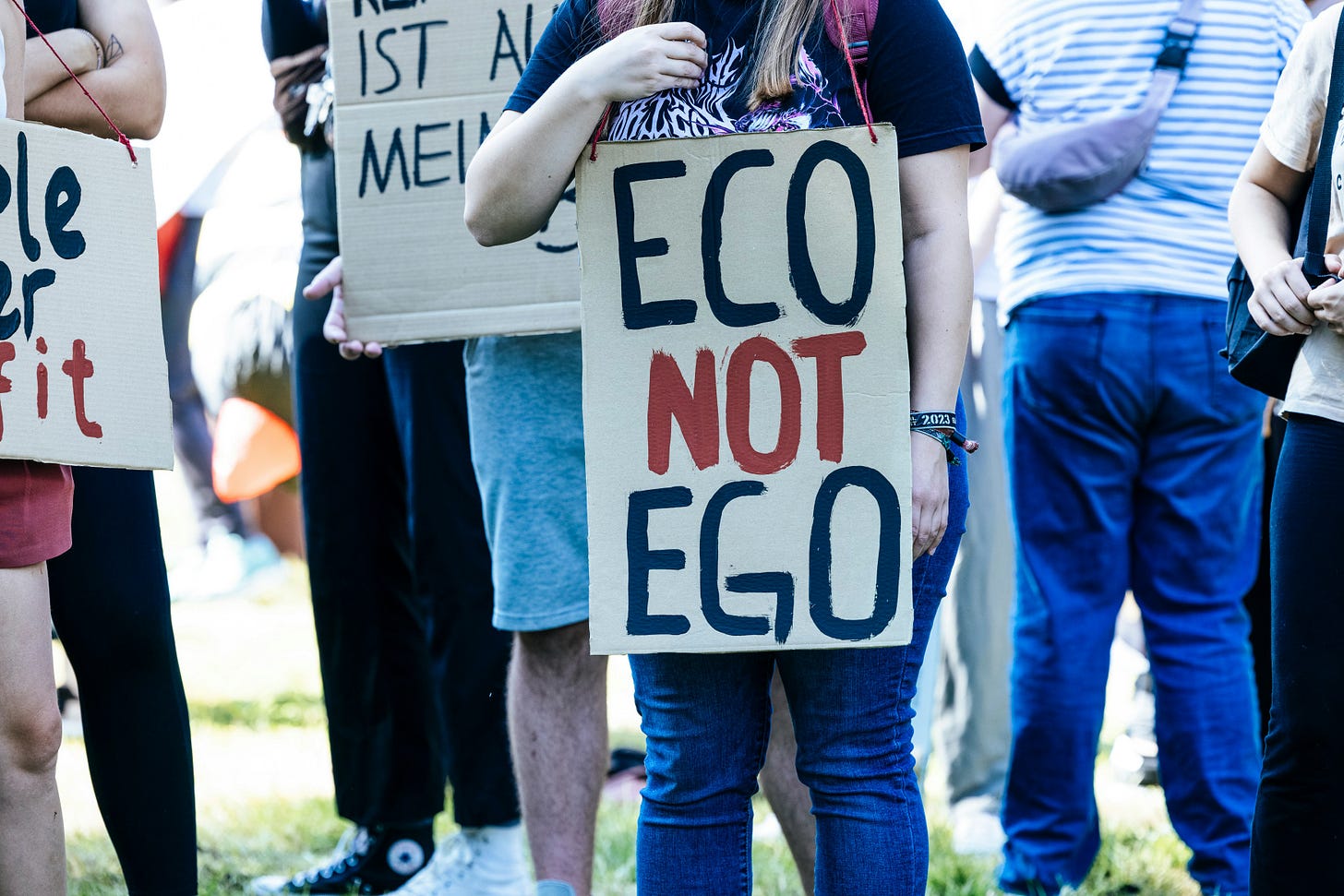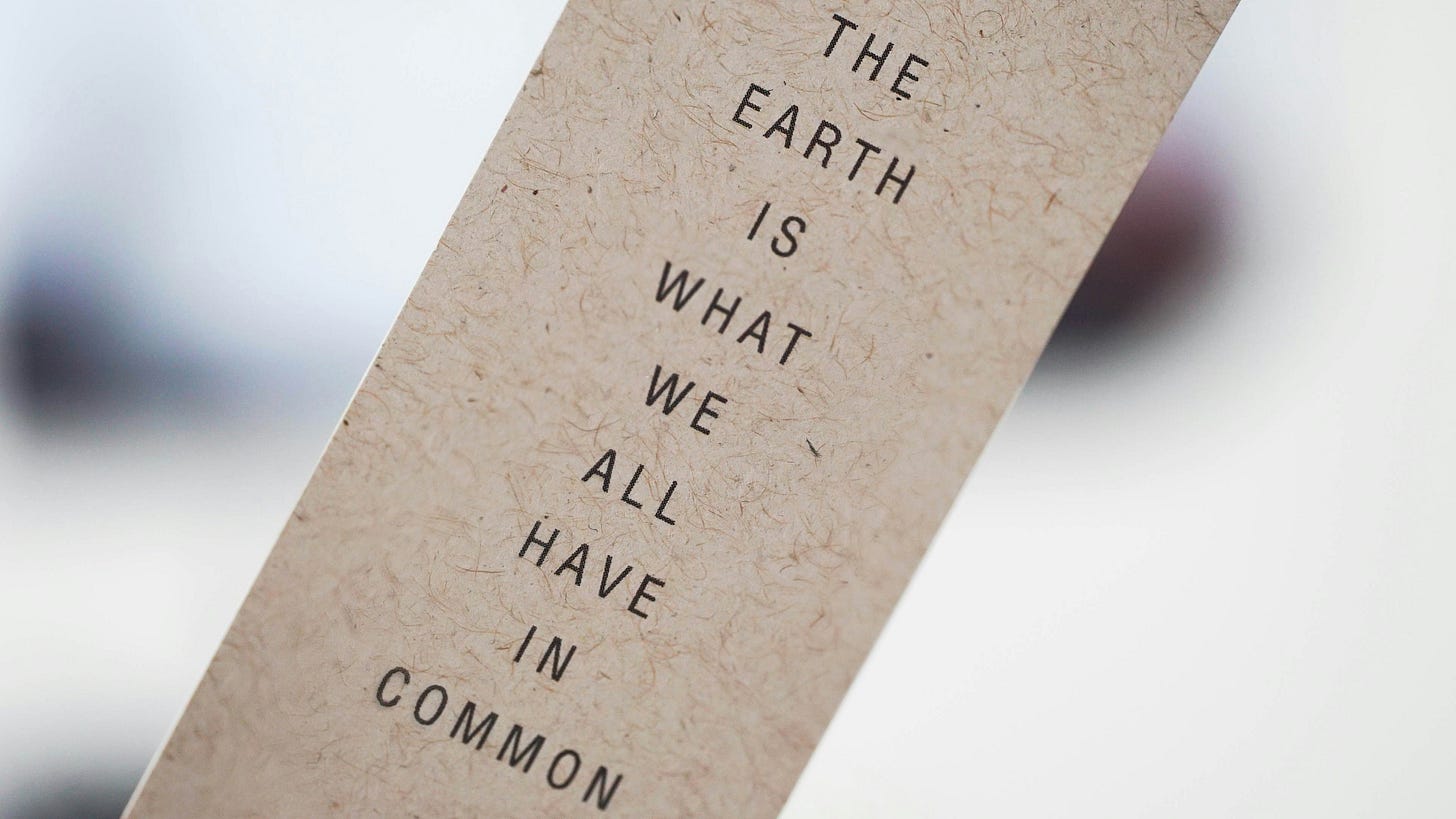When Christians Denounced Inequality
Before the church adopted the empire's rules
Welcome, friends! I’m so glad you’re here! This is such a challenging time, and I hope when you stop in here you find something inspiring, something to help you make sense of what’s happening and give you renewed juice for living. Posts and podcasts here are all free, always free. But if you find something valuable here, please consider a paid subscription if you are able. It helps a great deal! Either way, I’m grateful for your presence.
Today, a reminder that things were not always this way (my favorite kind of reminder!). In the decades when the Roman Empire was crumbling, there was a massive economic divide similar to the one in the US today. This was the same time that Christianity was becoming an imperial church. Today we look at how this sea change in the church’s status changed its thinking about wealth.

Like millions of others, I mourned the death of Bill Moyers recently—a voice so present throughout my life, always probing and urgent but also warm and kind. Moyers could see things most of us couldn’t, including that the very wealthy in this country had amassed enormous political power and that it was threatening democracy.
Back in 2013 he said,
We are so close to losing our democracy to the mercenary class, it's as if we're leaning way over the rim of the Grand Canyon and all that's needed is a swift kick in the pants. Look out below.
The predators in Washington are only this far from monopoly control over government. They have bought the political system lock, stock and pork barrel, making change from within impossible. That's the real joke.
He sounded a similar warning to the one that Justice Louis Brandeis sounded in the 1940s:
We can have democracy in this country or we can have great wealth concentrated in the hands of a few, but we cannot have both.
We have come now to the turning point they warned us of. We are have watched our social cohesion erode as inequality intensified. Inequality weakens physical health too—not just the health of the poor but of the affluent as well—and we have watched our health care system captured by private equity. And now the “mercenary class,” as Moyers called it, is attacking governance itself. Destroying the separation of powers because it is in their financial interests to do so. Accelerating climate change because the global fossil fuel lobby is the most powerful in the world.
We are at the reckoning.
I grew up thinking that inequality was normal. That it was just inevitable. Anyone who thought differently got laughed at—so naive! This happened even in church, even with the clear words of Jesus to the rich young ruler: “Sell what you own and give to the poor, and you will find treasure in heaven.” When I was a young person in Sunday school and this troublesome story came around, we were always skeptical. Yes, we wanted to follow Jesus, but follow him there? Surely he wasn’t serious? Someone might quickly bring up that other verse too: “The poor you will always have with you.”
We rationalized our way out of taking Jesus seriously.
So it’s not well known that once upon a time Christianity denounced inequality.
I told the story in chapter 12 of Kissed by a Fox, where the theme is reciprocity—or, as we knew it as children, sharing. How the Earth economy only works through giving back as well as receiving. How all our systems that encourage taking-without-end will have to change if we wish to survive. And most of all, how our story of ourselves needs to change so that we have the tools we need to build a new world, a world where everyone has enough.
But working against us is a thousands-of-years-old pattern of social hierarchy. Inequality is baked in to our social and economic systems. Which means that at an even deeper level, it’s baked in to our imaginations. The long history of inequality can keep us from imagining better commerce, better neighborhoods, better relationships.
So as I peruse history I’m always on the lookout for people and groups who departed from the pattern—people who challenged inequality in their time and can provide some support for brave imaginations today.
And one of those inspirations is a Christian bishop in the 380s CE, during the time when Christianity was becoming the official religion of the empire. Bishop Ambrose of Milan, the bishop to the emperor himself, preached often against inequality.
Ambrose became bishop in a very unusual way. In the 370s he was in his midthirties, the governor of the region around Milan, the capital of the empire at the time.
Ambrose had been born to this life by a wealthy family—his father a high-ranking bureaucrat, his mother an intellectual. The family’s estates were enormous. They were part of the 5 percent of people who owned more than 80 percent of the empire’s lands. (By some counts less inequality than in the US today.)
This massive inequality had already bled the empire dry of funds, because the wealthy held onto what they owned and passed it to their children. Yes, they were expected to be patrons of their cities, sponsoring public buildings and major entertainments and the like, but they were not required to give back to the public in any regular way, such as through a property tax. So the emperor’s coffers were empty—at a time when threat was greater than ever. Barbarians were already crossing the Rhine.
Ambrose’s family was a Christian one, part of a brand-new class of Christian aristocrats. In 312 the emperor Constantine had converted, and suddenly Christianity was respectable. So the richest families of the empire had begun converting too, and Ambrose’s was one of them.
While Ambrose was governor, the bishop of Milan died, unleashing near violence between different Christian factions. It was the governor’s job to keep the peace, so Ambrose hurried into the streets. And that’s when the crowd decided he should become their new bishop.
The story goes that he resisted the call with all his might. Some say he went into hiding. Others say he decided to show how unfit he was for the job by heading straight back to his judge’s chambers and handing out more sentences for torture—the standard Roman punishment in criminal cases. Then he invited prostitutes into his home.
Here’s the rest of the story from chapter 12 of my book Kissed by a Fox:
His resistance was futile; the emperor himself ordered Ambrose to the post of bishop, and in the space of one week Ambrose was baptized and consecrated to each of the successive levels leading to bishop. Soon after, he donated his share of the family fortune to the Church, distributing some of it to the poor. Now that Christianity was endorsed by the emperor, more and more of the politically powerful, landowning bureaucrats were converting, but Ambrose was one of the first to give away his property when he became Christian.
As bishop, he preached often against the chasm, already deep, that was growing in the empire, and now the church, between a few wealthy families and the rest.
Today few people are aware that early Christians worried about wealth and poverty. Even fewer know that before Christianity became the religion of empire, which means before the Church itself owned vast tracts of land, many Christians, including Ambrose, the emperor’s bishop, opposed the gathering of so much property into so few hands.
In one especially passionate sermon delivered probably in the late 380s, Ambrose took as his text the Old Testament story of Naboth and his vineyard (1 Kings 21). A poor man named Naboth owned a small vineyard that, unlucky for him, sat next to the king’s palace. One day the king decided he wanted the vineyard for an herb garden and offered to trade Naboth for a different vineyard. Naboth was hesitant to part with his family’s heritage and reluctantly said no. But it is dangerous to refuse a king. The king took to his bed and pouted, refusing to eat, and the queen, seeing his unhappiness, schemed to have Naboth executed.
Ambrose applied the story to his own time.
“How far, O rich, will you pursue your insane greed?” he railed. “The land was made to be shared among all, rich and poor alike,” he declared. “Why then, O rich, do you claim exclusive rights to the soil?” It was an offense against nature to amass property at the expense of others. “The world was created for all, but you rich men are trying to reserve it for yourselves. And not just the earth but the sky itself, the air, the sea—all reserved for the use of the rich few.
“Greed is whetted, not quenched, by gain!” he thundered on.
The remedy, said Ambrose, is to distribute the goods of the Earth. “Sell gold and buy salvation,” he urged. Share the proceeds with others. Remember that God is the ultimate owner of all goods. Follow the words of Jesus himself, who advised the rich young ruler: “Sell what you have and give to the poor, and you will have treasure in heaven” (Luke 18:22). Ambrose ended his sermon: “If you want to be rich, become poor in the world, and you will become rich in God.”
Ambrose was speaking from experience; he had been that rich young ruler, one of the few who followed Jesus’s instructions. For the former judge and governor, becoming a Christian bishop meant from that point on teaching people to share the goods of the Earth.
Look at exactly how Ambrose talked about wealth. At the time he preached this sermon, Christianity was brand-new in its role as official religion of the empire (it happened in 380). But only a few decades later, after the church had settled into this role, wealth would come to mean something entirely different.
Ambrose denounced amassing wealth because, he said, it goes against what God (or nature) intends. The land is meant to be shared. The Creator made it for everyone, and the law of nature is broken when some reserve it for themselves.
He was arguing from justice—making a fourth-century case for land as a commons. The rich are rich because they have taken what belongs to others.
To drive home the point, he said later in the same sermon (though I didn’t include this in the book):
It is not from your own property that you give to the poor. Rather, you make return from what is theirs. For what has been given as common for the use of all, you have appropriated to yourself alone. The earth belongs to all, not to the rich. Therefore you are paying a debt, not bestowing a gift.1
For Ambrose, giving to the poor was not a handout; it was repayment.
Yet only a few decades later the meaning of giving to the poor had completely changed.
We can see this in the writings of a young man who crossed paths with Ambrose in Milan.
That young man was Augustine, the most influential theologian of Late Antiquity, the same Augustine who formulated what became the doctrine of original sin, which would set the tone of the Western world forever after.
Augustine arrived in Milan to pursue a career in politics, but he was so inspired by the sermons of Ambrose that he converted to Christianity. A few decades later he too wrote about wealth, but he meant something dramatically different than what Ambrose had meant.
What had changed? Christianity had grown into its new role as the unifying force of a crumbling empire. The whole patrician class was now Christian, and many of them had donated their lands to the church, bequeathing them in their wills. Which meant that in only a few decades in the late 300s the church’s economic base had exploded in size, dramatically increasing its social and political power. The same chasm between rich and poor that was so embedded in Roman life was now mirrored in the church.
So Augustine had to reimagine greed. From Kissed by a Fox:
Greed came to be imagined more and more as an internal spiritual flaw, a case of what Augustine, only a few decades after Ambrose, would call concupiscence, or “lusting after”—the hallmark of original sin. As soon as greed became an individual spiritual failing, generosity turned into a remedy for sin. Giving away riches was transformed from a public act that challenged social and political inequality, as it still was in Ambrose’s day, to a private act of personal piety.
In his sermon Ambrose instructed the wealthy to share the goods of the Earth to improve the lot of the poor and move society toward greater equality. But in the decades to come, much of this vision for equality was diluted as Christianity adopted the powers of empire and then became a feudal landowner in its own right.
Such a transformation! From greed as an offense against others to greed as a private sin. From giving to the poor as repaying a debt to giving to the poor as a way to earn spiritual points. Generosity lost its meaning of justice; it was reduced to a private virtue.
The empire had functioned for hundreds of years by rewarding wealthy people with high status and political power. So when Christianity became the religious arm of the empire, it followed those same rules. The imperial church forgot what Christians up until the time of Ambrose remembered: that Jesus challenged wealth, that he said it was easier for a camel to pass through the eye of a needle than for a rich man to enter the kingdom of heaven. Once Christianity became an imperial church, bishops no longer denounced inequality; instead, the church reproduced it.
The problems of a politically splintering, economically broke empire were not going to be solved by a few more wealthy bureaucrats giving away their property to the poor. The changes needed went far deeper than that. The empire needed nothing less than to address the rules that had enshrined such vast inequality in the first place.
It’s the same depth of change that is needed today.
We are at the reckoning that Bill Moyers saw coming. The “predators in Washington” have succeeded in gaining their monopoly control of government. Democracy is under attack because government has been bought. And the very same conditions of inequality are threatening our very ability to live on planet Earth. The old rules are wrecking us—and they were wrecking us even before the current regime.

When severe inequality separates people from one another, people separate more easily from the more-than-human community as well. Poverty is incompatible with sustainability. So is great wealth.
The rules have to change if democracy is to survive.
If WE are to survive.
There are many many ways to change the rules, and in chapter 12 of the book I talk about one of them. It’s an idea suggested by economist Ronald Trosper (Confederated Salish and Kootenai Tribes of the Flathead Indian Reservation of Montana) based on the potlatch system of people of the Northwest Coast.
The coastal people ran a sustainable system for two thousand years that gave them a high level of prosperity. Their secret? They set their economic incentives to reward generosity instead of hoarding. The more generous a person could be, the more respect and honor and status they were given. (Just the opposite of the age-old pattern in the West of rewarding wealth accumulation with status.) Because people’s social standing and identity depended on being able to give generously, they had to harvest sparingly in order to have enough to share. And when the relatives of Earth—the salmon, the berries, the plants—were treated in this respectful way, they responded with generosity. Everyone had enough.
Trosper has some ideas for how to translate potlatch values into the contemporary world, and you can find out more by checking out his writings.
We have to change the rules. We CAN change the rules.
Different choices are possible; different stories can be told. It is we humans who made the rules of commerce, and we can unmake them too.
Now, when so many institutions are under attack, is a time to imagine new worlds and do what we can to work toward them.
Doors of unpredictability can open at just such a time as this. Let’s put our brave imaginations together. Let’s help those doors open.
Thank you so much for the gift of your attention!
Be sure to hit the LIKE button before you go!
This post is part of the series “Kissed by a Fox: Short Takes,” available in the menu bar of my home page. If you’re not familiar with the book, welcome! It won the 2013 WILLA Award in Creative Nonfiction and continues to find its audience. Maybe you’ll be one of them! You can find the book at Bookshop.org, where every purchase supports your local bookstore. When you use my affiliate link, I receive a tiny bit extra.
For more info on the book, see my website.
I’ve been working hard on the audiobook, now finishing chapter 12, the final chapter. Hope to release it later this year! Stay tuned.
What did this post spark for you? Let us know in the comments.
For digging deeper
Watch a clip of Bill Moyers uttering his warning about the mercenary class at “Remembering Acclaimed Public TV Journalist Bill Moyers.”
On inequality and health, see “Facts: Inequality and Health” at Inequality.org.
I was reminded this week of research on inequality and health by a wonderful interview: Mary-Charlotte Domandi interviewing Dr. Wendy Johnson, author of a brand-new book: Kinship Medicine: Cultivating Interdependence to Heal the Earth and Ourselves. The interview is “Thinking Ecologically—About Human Health.” Their conversation on health and inequality happens about halfway through.
On wealth inequality in the Roman Empire, see Peter Heather, The Fall of the Roman Empire: A New History of Rome and the Barbarians (Oxford University Press, 2007). He says less than 5 percent of families owned 80 percent of land (138), though other historians estimate that less than 1 percent of people were landowners. For side-by-side comparison with the US, see “The United States Has Worse Inequality than Ancient Rome,” The Intellectualist, Nov. 4, 2023.
Translations of Ambrose’s Latin sermon “On Naboth” are my own, guided by the translation and commentary of Martin R. P. McGuire, S. Ambrosii De Nabuthae (Catholic University of America, 1927), available at the Internet Archive. Quotes are from paragraphs 2.1; 3.11; 2.4; 14.58–59. Ambrose might have seen through his society’s assumptions about wealth, but he was not so visionary in other ways. He was also deeply sexist and anti-Semitic, including in this same sermon, where he railed against women’s adornments and Jewish influences. Details of his consecration as bishop come from Neil B. McLynn, Ambrose of Milan: Church and Court in a Christian Capital (University of California Press, 1994). Ambrose’s attitudes toward rich and poor are central in the work of Vincent R. Vasey, S.M., The Social Ideas in the Works of St. Ambrose: A Study on De Nabuthe (Rome: Institutum Patristicum “Augustinianum,” 1982).
Ron Trosper wrote about the economics of the potlatch system in “Incentive Systems That Support Sustainability: A First Nations Example,” Conservation Ecology 2, no. 2 (1998); see also his recent book, Indigenous Economics: Sustaining Peoples and Their Land (University of Arizona Press, 2022). Listen to an interview with Ron Trosper at the Indigenous Economics page at New Books Network.
This is from section 13.54 of the sermon, translator unknown. Posted on Bluesky by @prxiru.bsky.social, Apr. 7, 2025.











Love this good for thought and the invitation to reimagine a new (old) way.
Mercenary class
wrecking planet. Let’s reckon.
Eco o’er ego.